Curated OER
Target Earth
Space scientists use water displacement to determine the mass of a cubic centimeter mini meteorite, and then use it as a small-scale representative of an asteroid. They figure out the orbital velocity of an asteroid. Then they use a...
Curated OER
Comet Myths, Facts, and Legends
Here is an interactive book lesson through which learners explore the facts and stories about comets. The plan is comprehensive, providing background information, standards met, vocabulary, assessment ideas, and more. Though the content...
NASA
Whip Up a Moon-Like Crater
The moon is famous for its craters, but they haven't always been there. Young learners experiment with materials to simulate the creation of moon craters. Pupils are able to see patterns in their materials that are similar to the...
Curated OER
Spotting an Approaching Asteroid or Comet
For this asteroid and comet worksheet, students read about the formula used to determine the brightness of asteroid. They apply this formula to solve 2 problems about asteroids and their brightness.
Curated OER
Asteroids
Students examine the different types of asteroids and how they enter the atmosphere. In this space lesson students use mashed potatoes to create an asteroid they can eat.
Curated OER
Dinosaurs, Comets, Asteroids
In this dinosaurs learning exercise, students answer multiple choice questions about dinosaurs, comets, and asteroids. Students complete 3 questions.
Vosonos
Interactive Minds: Solar System
Travel through space as you learn about the galaxy, solar system, planets, and much more. An extensive resource for studying astronomy in upper-elementary and middle school classrooms.
Curated OER
Sweet Candy Comets
Fourth graders use candy to make a comet. In this lesson, 4th graders examine the role comets have played throughout history, students watch NASA videos about comets and complete the lesson by making an edible model of a comet. This...
Mr. Hill's Science Website
Solar System Fact Sheet
Here is a fantastic, educational handout packed with information and facts not only about the planets in our solar system, but also regarding major moons and their surface features, dwarf planets, comets, and asteroids.
Curated OER
TARGET EARTH
Learners explore the possibility of an asteroid hitting planet earth. In this planetary lesson students complete a lab activity to see the effects of an asteroid hitting earth and compare different craters.
Curated OER
The Difference Between Comets, Meteors And Asteroids
Students use Venn diagrams to highlight the similarities and differences between comets, meteors, and asteroids.
Curated OER
Tour of the Solar System
Learners engage in science, math, and language activities as they do research on the components of the solar system. The class begins with some anticipatory activities and discussions before it is divided into small groups to conduct...
Curated OER
Comets
Students explore the nature and composition of a comet. They research comet facts, legends, and myths. They identify different types of comets and describe what happens to a comet as it travels closer to the Sun.
Curated OER
Objects in the Solar System
Eighth graders define a planet by the orbit around the sun, have a large enough gravitational force to hold a sphere shape and needs to clear the neighboorhood of it own orbital zone. They describe comets, meteoroids, meteor, meteorites...
Curated OER
Comets And Meteor Showers
Students fill in a diagram of a comet. They listen to a short lecture, view flash animation descriptions of comets and meteors and then use the presented information to complete a worksheet.
Curated OER
Space Science
Eighth graders study the objects in our solar system. In this space lesson students identify and describe planets, then classify them as terrestrial or gaseous.
Curated OER
Space Science: Journey Through the Solar System
Students explore the Solar System and examine the characteristics of al the planets. Through research and discussion, they create catalogs of the Solar System's components. Next, students use their findings to create Powerpoint...
NASA
Art and the Cosmic Connection
Solar art inspires! Scholars study planetary geology with an artistic analysis. Pupils view a PowerPoint presentation on the solar system and space exploration and then try their hand at planetary image analysis using art techniques.
Curated OER
Scavenger Hunt: Who am I?
In this solar system worksheet, students use an on line source to find the names of the people who discovered the planets, comets, asteroids, black holes and the idea of the big bang theory.
University of Colorado
The Jovian System: A Scale Model
Jupiter has 67 moons! As the seventh in a series of 22, the exercise shows learners the size and scale of Jupiter and its Galilean moons through a model. They then arrange the model to show how probes orbited and gathered data.
Curated OER
The Appearance of the Moon
Third graders watch a demonstration on how craters were formed on the moon. Individually, they care given a set of materials that represent the moon surface and make their own craters. To end the instructional activity, they measure...
Curated OER
Sample the Solar System
Students identify different features of the solar system. They analyze the sun, moon, planets, comets, and asteroids. They use the Internet and other resource sources to find information about the solar system.
Curated OER
Scale Model of the Solar System
Students work in groups of 4-6 for the experiment/activity part of this exercise. Students know that earth is the third planet from the sun in a system that includes the moon, the sun, eight other planets and their moons, and smaller...
Curated OER
Our Solar System
In this solar system instructional activity, students read about the planets, asteroids, meteoroids, comets, and the moon. Then students complete 25 multiple choice, 4 true or false, and 3 short answer questions.

























